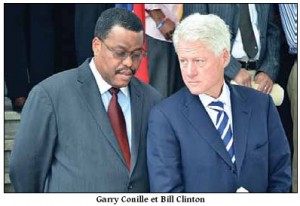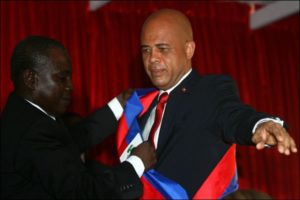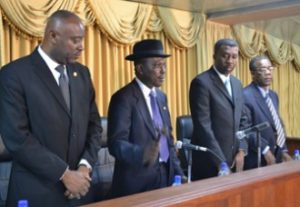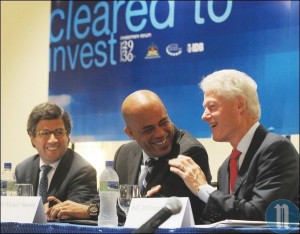
Prime Minister Garry Conille and Bill Clinton
Haitians began 2011 with heavy hearts as they approached the first anniversary of the Jan. 12 earthquake that crippled their homeland and crushed 316,000 lives. Haitian leaders watched a steady stream of nongovernmental organizations (NGO) invade the country, carrying a $1-billion purse collected on behalf of the victims. Meanwhile the population remained on edge, following violent eruptions over fraudulent elections that left Port-au-Prince and surrounding communities in flames. Still in its very early stage, cholera ran through rural areas like a bulldozer, leaving Haitians in a state of panic while flat lining anything with a heartbeat.
Buried deep under 20 million cubic meters of debris, Haitians outsourced their hope on the international community that pledged $5.3 billion to help the country back on its feet. Former U.S. President and UN special envoy to Haiti Bill Clinton rose to immediate stardom, rushing to the scene and pledging full U.S. support. “In fact, Clinton is the real president of Haiti,” recently proclaimed rights advocates, during a meeting in Sao Paolo, Brazil. Clinton Co-chaired the Interim Commission for the Reconstruction of Haiti (ICRH) with former Prime Minister Jean-Max Bellerive, a regulatory entity to oversee reconstruction projects patterned on the Indonesian Commission, following the 2004 tsunami.
Only four days after Haitians mourned their dead on the anniversary of the devastating earthquake, ex-dictator Jean-Claude “Baby Doc” Duvalier stormed the Haitian capital after a nearly 25-year exile in France. “It’s such a critically important time for Haiti and for this guy to drop in from nowhere is very strange,” declared associate professor of International affairs at Trinity University in Washington DC, Robert Maguire. He told the Miami Herald, “What does he bring to Haiti, aside from a lot of confusion. Does he come back with political pretensions? We just don’t now.” However, speaking to reporter of Radio Caraibes, Duvalier said, “I’m not here for politics, I’m here for the reconstruction of Haiti.” Prosecutors leveled many charges against the former president for life the day after his impromptu reemergence, but they have yet to bring Duvalier to trial.

President Michel Martelly
Meanwhile, the Disputed Nov. 28 elections results remained a point of contention for politicians as independent arbitrator Organizations of American States (OAS) recommended excluding Jude Celestin, the government’s candidate, from the second round of the elections. Instead of demanding a recount, OAS put Michel Martelly ahead of Celestin, reversing the official results of the Provisional Electoral Council (CEP); thus, paving the way for Haiti’s 56th president. Haitians returned to the polls to either elect former first lady and constitutionalist Mirlande Manigat or former bandleader Michel Martelly, but not before going through another traumatic episode when twice elected and twice disposed President Jean Bertrand Aristide landed in Toussaint L’Ouverture Airport three days prior. “The problem is exclusion,” Aristide proclaimed in a 15-minute address to supporters. “And the solution is inclusion, inclusion for all Haitian people as human beings,” he added. Many people understood that the former leader was referring to the exclusion of his political party from participating in the elections.
“The task is immense, but a new Haiti opens for business now,” declared President Martelly during his inaugural address, promising leadership based on the rule of law. “We want justice for everyone,” he said. Six month later however, the new president went through a series of hurdles that exposed his political inexperience. A constitutional melee over proposed amendments awaited Martelly as parliament rejected his first two nominees for prime minister before Garry Conille narrowly won the nomination. Entrepreneur Daniel Rouzier and former Justice Minister Bernard Honorat Gousse did not survive the ratification process, plunging the country into a 4-month political deadlock. Eventually, American diplomats went to Haiti to express the Obama Administration’s preoccupation with the crisis that threatened to derail rebuilding efforts.

Haitian Senators
With a populist win at his back, President Martelly went on a series of national tours, promoting anything from agriculture to tourism. Instead of talking about those initiatives however, the press cried foul, denouncing the president’s infamous “shut up,” sniped at a highly critical Haitian media, as a deliberate attack on freedom of the press. Similar conflicts followed not only with the press he branded enemy of tourism and development, but also with lawmakers the president called prison escapees hiding in parliament. Hostilities escalated between the executive and legislative branches, leading to the police’s arrest and detention of Deputy Arnel Belizaire, as he returned from a diplomatic mission in France. Those blatant constitutional violations cause lawmakers to denounce a rising Martelly dictatorship, drowning the country into yet another crisis. As a result, lawmakers threatened to fire Martelly’s entire government and to even impeach the president. In addition, Martelly imposed a $1.50 and $.05 tax on money transfers and phone calls made to Haiti. The money collected would fund free education for disadvantaged children, he said. However, the president refrained from using the funds absent any legal framework or parliament’s approval. The Department of Education admitted to using state funds to launch the free education program; meanwhile, several news reports claimed that $26 million went missing from the National Fund for Education, the entity Martelly created to manage the unilaterally imposed tax.
Many reconstruction projects, though undetected by the media’s radar, came to life, particularly numerous efforts to develop a sustainable middle class to promote economic growth in Haiti. Working with the banking industry, the Clinton Bush Haiti Fund eased credit restrictions for entrepreneurs, including the arts and crafts sector he thought had great potential for success. Similarly, Haiti’s famous coffee found new life, resurging in Japanese cups, as well as the U.S., Rotary International, and most recently Columbia in partnership with the Inter-American Development Bank that signed an agreement to increase Haiti’s coffee production. Other notable improvements included Martelly’s free education for Haitian children, though critics argued the program was poorly organized and precipitated. Haiti’s mango industry also received considerable attention and restructuring.

Invest in Haiti 2-day forum
Amid the chaos, child trafficking businesses boomed, absent any pragmatic child protective services or border security with the Dominican Republic. Violent crimes against women and girls in vulnerable tents peaked, as did Haiti’s inflation rate. Moreover, a video of Uruguayan soldiers allegedly raping a young Haitian male surfaced on the Internet, sparkling worldwide outrage while fueling anti-UN sentiments in Haiti. The population, angry over UN occupation and the cholera epidemic, charged the public sphere, demanding a complete and immediate withdrawal of peacekeepers on its homeland. Still, a particularly brutal hurricane season battered the crumbled nation repeatedly, flooding several parts of the country and causing widespread panic.
With 2011 in the rearview mirror, many observers perceived Deputy Belizaire’s arrest and overnight detention as the shock of the year, especially when the Haitian Constitution forbade such arbitrary actions. The President’s failure to rebuild the Haitian army within his proposed time frame might be considered a close second given his aggressiveness pursuing its resuscitation. While many people welcomed President Martelly’s outsider status as the catalyst for change, others argued the contrary; inexperience was not what Haiti necessitated. However, former President Clinton emerged as the most influential personality in 2011, leaving gigantic fingerprints on most reconstruction projects. As Haiti anticipates a productive 2012-year, many eyes will be on new Head of Government Garry Conille who has yet to assume full command as Prime Minister. While some people saw his U.N. and Clinton ties as an asset for developing the country, others, suspicious of UN’s goals and objectives, expressed little hope for any pragmatic changes, especially in Haiti’s constant struggle against peacekeeping forces.